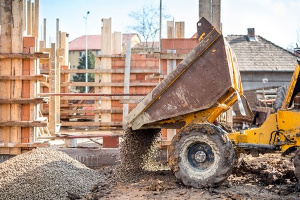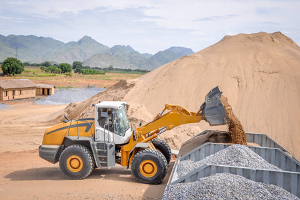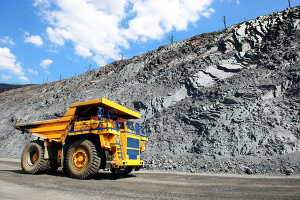 As a home or business owner undertaking substantial construction work, there’s a lot to learn about the construction process. From the early stages of planning to the finishing touches, one often overlooked but critical aspect of construction is waste management—specifically, how to handle the piles of rubble, debris, and raw materials left behind once the work is completed. Effective debris management is key to keeping your project site safe, efficient, and environmentally responsible. One solution that stands out is material crushing, a process that breaks down large construction debris into smaller, manageable pieces.
As a home or business owner undertaking substantial construction work, there’s a lot to learn about the construction process. From the early stages of planning to the finishing touches, one often overlooked but critical aspect of construction is waste management—specifically, how to handle the piles of rubble, debris, and raw materials left behind once the work is completed. Effective debris management is key to keeping your project site safe, efficient, and environmentally responsible. One solution that stands out is material crushing, a process that breaks down large construction debris into smaller, manageable pieces.
Material crushing not only simplifies waste removal but also offers opportunities to recycle and repurpose materials for future use, reducing costs and minimizing environmental impact. In this expanded guide, we’ll discuss the basics of material crushing, on-site services, the types of crushing equipment available, material screening processes, and how dump truck hauling ties it all together.
What is Material Crushing?
Material crushing is the process of breaking large particles and debris—such as rocks, concrete, or other construction refuse—into smaller particles. This process serves several critical functions:
- Ease of Transport: Large piles of bulky materials like rocks or concrete slabs can be difficult to move and often damage transportation equipment. Breaking these materials down into smaller particles makes the transportation process safer and more fuel-efficient.
- Waste Management: Crushing substantially reduces the volume of waste produced on-site, which helps streamline cleanup efforts while minimizing costs.
- Repurposing Waste: Creating smaller particles enables construction companies or property owners to reuse materials for future projects, such as building pathways, driveways, or retaining walls.
The Advantages of On-Site Material Crushing
When you hire a company that provides on-site material crushing, you save time, money, and logistical headaches. Here’s how:
- Cost Efficiency: Transporting large, unprocessed materials to another location for crushing can be expensive due to additional labor, fuel, and vehicle wear-and-tear costs. On-site material crushing eliminates this extra transportation burden.
- Convenience: Having crushing equipment set up directly on-site allows for debris to be processed immediately, so you don’t need to wait weeks for material to be hauled off first.
- Reduced Environmental Impact: On-site material crushing reduces the number of trips required to transport materials, minimizing vehicle emissions and fuel usage.
For projects that generate significant amounts of waste—like building demolitions or large-scale renovations—on-site material crushing can mean the difference between an efficient job and a logistical nightmare.
Types of Crushing Equipment
Different types of equipment are suited for specific crushing tasks. Two primary types of crushers used in on-site material crushing are impact crushers and compression crushers:
1. Impact Crusher
An impact crusher operates by using forceful impacts to break materials into smaller pieces. Here’s how it works:
 Process: The crusher’s rotor throws materials against hard surfaces within a crushing chamber, shattering them into smaller chunks through repeated impacts.
Process: The crusher’s rotor throws materials against hard surfaces within a crushing chamber, shattering them into smaller chunks through repeated impacts.- Applications: Ideal for softer materials or debris with lower density. Impact crushers are commonly used to process materials like concrete, bricks, or asphalt.
- Advantages:
- Easy operation
- High efficiency
- Ability to process various materials
2. Compression Crusher
The compression crusher works on an entirely different principle compared to the impact crusher.
- Process: Instead of using impact, this crusher applies immense pressure to compress materials, eventually causing the particles to break apart.
- Applications: More suitable for harder materials like dense rock, granite, or heavily compacted debris.
- Advantages:
- Handles high-density materials effectively
- Produces uniform particle sizes
When considering crushing services, consult your contractor about the type of equipment that best matches your materials. Using the wrong crusher can damage surfaces, slow the work, or fail to produce the desired material size.
Material Screening: Separating Usable and Waste Material
Once materials have been crushed, the next step in managing construction debris is material screening. Material screening separates particles based on size, allowing usable materials to be set aside for recycling or reuse while filtering out waste that needs disposal.
Benefits of Material Screening
- Reduce Waste Transported to Landfills: Screening reduces the amount of waste you need to haul away, lowering your disposal costs.
- Support Future Projects: By retaining usable materials, such as crushed stone, you can plan for future landscaping or construction needs without purchasing new materials.
- Improved Project Efficiency: Screening allows you to precisely sort materials based on their properties, such as size or cleanliness, which makes it easier to use compatible materials in various applications.
How Screening Works
Screening equipment functions like a large industrial sieve. Here’s what to expect:
- Particle Separation: Screens divide demolition debris into smaller and larger particles, based on your desired size.
- Dust and Water Removal: Advanced screens can also remove dust or filter excess water from materials, leaving a cleaner, drier final product.
- Customization: Many modern screening machines allow users to define the exact particle size needed—useful for creating uniform materials for driveways, drainage systems, or other specific projects.
By using screening, property owners can save many valuable materials such as crushed concrete or gravel for future use, reducing dependence on new resources.
The Final Step: Dump Truck Hauling
After crushing and screening, you’ll still need to remove the remaining debris and smaller waste materials from the construction site. This is where dump truck hauling services come in.
What is Dump Truck Hauling?
Dump truck hauling refers to the use of specialized vehicles designed to transport loose, heavy materials such as gravel, sand, dirt, or crushed debris. Dump trucks are equipped with beds that tilt hydraulically, enabling efficient unloading of materials once they reach their destination.
Why Partner With Dump Truck Hauling Services?
- Efficient Waste Removal: Debris is cleared from the site in fewer trips thanks to the significantly increased volume capacity of dump trucks.
- Versatility: Whether you’re transporting crushed debris, dirt, or excess gravel, dump trucks handle materials of many varieties.
- Safety: Professional hauling ensures both workers and site visitors remain safe during debris removal, as heavy loads are managed by experts.
Once hauling services are completed, your construction site will be clear and ready for landscaping, further construction, or any other planned work.
Why Material Crushing and Screening Matter
 Material crushing and screening represent a shift towards more sustainable and efficient construction practices. Rather than treating construction debris as waste, these processes transform rubble into valuable resources, save on landfill fees, and reduce environmental impact.
Material crushing and screening represent a shift towards more sustainable and efficient construction practices. Rather than treating construction debris as waste, these processes transform rubble into valuable resources, save on landfill fees, and reduce environmental impact.
By incorporating on-site crushing and screening into your project, you not only promote sustainability but also benefit from cost savings and simpler logistics. Pair these services with professional dump truck hauling, and your construction cleanup process will be as efficient as possible.
Get in Touch with the Northern Virginia Material Crushing Experts
Whether you’re building a new structure, tearing one down, or clearing land for future use, construction debris management is a critical component of the process. Material crushing, screening, and hauling work together to minimize waste, repurpose materials, and ensure the construction site is cleared efficiently.
Reach out to our material crushing and screening experts at Dirt Connections. By combining material recycling with expert waste removal, your construction project will leave behind not just a completed structure but also a cleaner, more sustainable environment.








































